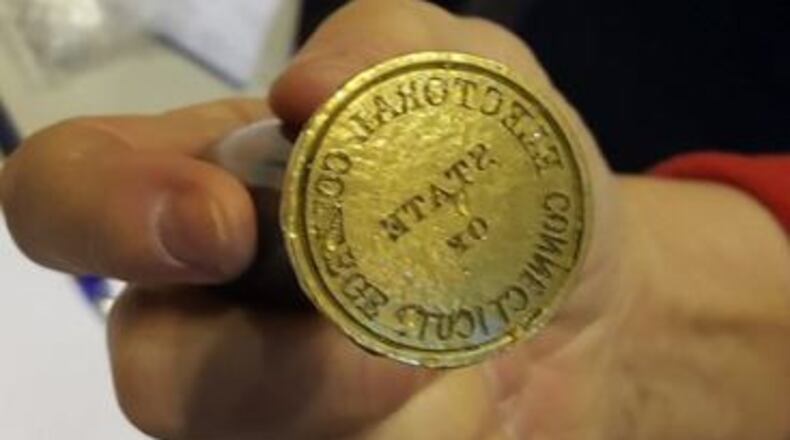What is normally a symbolic vote for President by the Electoral College has taken on different overtones this year in the wake of President-Elect Donald Trump's victory, as frustrated Trump opponents have tried to put together a last-ditch effort to derail Mr. Trump, but as of now there is little evidence those efforts will bear fruit.
Here is some of what you can expect to see on Monday:
1. Last chance for critics to deny Trump a victory. My inbox has been filled in recent days with the missives of more liberal groups trying to stop the President-Elect. "Tell the electors to reject Trump," wrote the group MoveOn.org. "The electors should follow the will of the people," said Daniel Brezenoff, who started the push for a petition to get the Electoral College to stave off a Trump Administration, arguing that, "Trump lost the popular vote by a historic margin and he should lose on December 19 at the Electoral College." But so far, other than Texas elector Chris Suprun and a few others, the anti-Trump Electoral College effort seems to be falling short.
2. Usually unknown, many electors instead facing public flak. Unfortunately, the stories have been all too numerous to ignore in recent weeks, tales of electors from both parties getting all sorts of grief on their cell phones, via social media and more about their Electoral College vote. "This is absolutely unacceptable and those participating in or encouraging these efforts should stop," said Georgia Secretary of State Brian Kemp, who noted "numerous reports" of electors being insulted and more. The President-Elect weighed in on that Sunday, arguing that there should be a bigger public backlash against those who have been targeting Trump electors.
3. Some Democrats say dumping Trump would be a mistake. Even though the thought of Donald Trump in the White House makes their skin crawl, there have been Democratic voices arguing a move by the Electoral College to throw this election into the House of Representatives would be a mistake. "Reversal would rip country apart," tweeted David Axelrod over the weekend. Axelrod, once a top campaign strategist for President Obama, is among those who thinks Trump might be a disaster - but he argues stopping him now is wrong.
4. What happens if the Electoral College revolts? Again, I'm going to preface this by saying - yes - it is technically possible that the electors could deny Donald Trump a win. It is possible they could vote for Hillary Clinton. They could also throw the election to the House. But let's be honest - it is also possible that I could win the lottery this week and quit my job before Christmas. The chances of that happening though is very, very small. Yes, you can make the argument that the Founding Fathers created the Electoral College, because they wanted to put a filter between the voters and who was chosen as President. But the Electoral College has never taken that step.
5. Even Saturday Night Live spoofed an Electoral College upset. As one would expect, the folks at Saturday Night Live could not resist doing a piece about the Electoral College this past weekend, with a skit that showed Hillary Clinton showing up at the home of an elector, and asking her to help. "You're supposed to vote for Donald Trump," Clinton says with cue cards shown on screen. "But Bish...he cray," the card says, drawing a reluctant grin from the actress playing the elector and chortles from the New York crowd, which one would not expect to have too many Trump voters in the audience.
6. A number of states don't let electors change their votes. While there is a lot of talk about a revolt by the Electoral College, over the years, various states have put in a number of restrictions on what their electors can do. Ohio has a state law which says the electors have to vote for the nominee that appointed them. Minnesota's law says if you try to change your elector vote, you will be replaced by a substitute elector. Colorado has a law that forces electors to back the candidate who won that state. In Michigan, if you don't vote for the candidate you are supposed to back, that is considered an act of resignation, and you are replaced. So, while there is talk about a revolt, there are a number of hurdles in the way of that effort. Maybe you might see a couple of votes change, but probably not more than that.
7. No intelligence review for electors on Russia. Despite calls by some electors and Democratic lawmakers, there was no special review given to electors about any election meddling by Russia. "US intel says Putin was personally involved in interfering with our election," said Rep. Don Beyer (D-VA), who even pushed to delay the Electoral College vote in order to give electors information about Russian actions. But the Director of National Intelligence refused to grant any special briefing. It left some Democrats in the Congress frustrated.
8. Finally, let's not forget the historic nature of this event. Usually, the Electoral College vote doesn't mean much, and gets covered by the news media in the context of being part of the historic election plan created by the Founding Fathers. But even with all of the controversy in 2016, this remains an event steeped in history. On Friday, the Secretary of State in Connecticut tweeted out photos of her staff getting ready for Monday - there was no talk about electors switching their votes or anything - instead, it was "Practicing the ceremonial melting of the sealing wax" and more.
Credit: Jamie Dupree
Credit: Jamie Dupree
About the Author
The Latest
Featured




